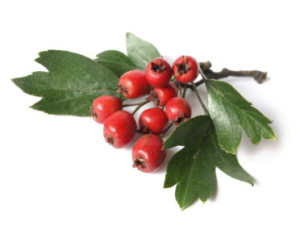Hawthorn is a plant. The leaves, berries, and flowers of hawthorn are used to make medicine.
Contents
Uses
- Hawthorn may have a role as adjunctive therapy in mild heart failure and exhibits some advantages over digoxin. In more severe cases of congestive heart failure (CHF), its place in therapy is less clear. Studies in animals suggest that hawthorn extracts exert effects on the CNS, including relief of anxiety and pain; however, clinical studies are limited. Although limited clinical studies have shown improvement in high cholesterol with hawthorn extracts, specific, well-designed trials are needed before hawthorn extracts can be recommended.
Benefits
-
Antioxidants
Hawthorn contains a number of flavonoid compounds that may be useful for treating and preventing cardiovascular disease, according to the University of Maryland Medical Center. In particular, it boasts high levels of quercetin and oligomeric proanthocyanidins, or OPCs, which neutralize free radicals that can damage cells and promote arterial plaque formation, or atherogenesis. A laboratory animal study published in the March 2011 issue of the “China Journal of Chinese Materia Medica” found that four weeks of hawthorn supplementation caused changes that led the authors to conclude that hawthorn berry “could inhibit” atherogenesis. Further studies are needed to confirm these preliminary results.
Congestive Heart Failure
Hawthorn has been used successfully to treat mild to moderate congestive heart failure in several reliable studies, according to New York University Langone Medical Center. A review of 10 previously published studies that appeared in the January 2008 issue of the “Cochrane Database of Systematic Reviews” found that hawthorn supplementation in conjunction with conventional treatment decrease oxygen consumption and increased exercise tolerance significantly. Study participants also reported less shortness of breath and fatigue with hawthorn supplementation. Researchers concluded that hawthorn shows potential for considerable benefit in the treatment of chronic heart failure.
Cholesterol
Cholesterol-lowering effects of hawthorn are possible due to the herb’s ability to increase the liver’s absorption of low-density lipoprotein, or LDL cholesterol, according to R. Watson, co-editor of the book, “Botanical Medicine in Clinical Practice.” A laboratory animal study published in the July 2012 issue of the journal, “BMC Complementary and Alternative Medicine,” found that supplementation with hawthorn leaves and flowers significantly reduced cholesterol levels. Further studies are needed to confirm these preliminary results.
Cautions
- Please see: http://nutrawiki.org/hawthorn/
Interactions
- Please take a look at: http://nutrawiki.org/hawthorn/
Other names
Aubepine, Aubépine, Aubépine Blanche, Aubépine Épineuse, Bianco Spino, Bois de Mai, Cenellier, Chinese Hawthorn, Crataegi Flos, Crataegi Folium, Crataegi Folium Cum Flore, Crataegi Fructus, Crataegus cuneata, Crataegus kulingensis, Crataegus laevigata, Crataegus monogyna, Crataegus oxyacantha, Crataegus pinnatifida, Crataegus rhipidophylla, English Hawthorn, Epine Blanche, Epine de Mai, Espino Blanco, Fructus Crataegi, Haagdorn, Hagedorn, Harthorne, Haw, Hawthrone, Hedgethorn, LI 132, LI132, May, Maybush, Maythorn, Mehlbeebaum, Meidorn, Mespilus laevigata, Nan Shanzha, Noble Épine, Oneseed Hawthorn, Poire d’Oiseaux, Sable Épine, Shanzha, Shen Zha, Weissdorn, Whitehorn, WS 1442, WS1442
References
Source: Healthy Eating, http://healthyeating.sfgate.com/health-benefits-hawthorn-extract-5211.html
Drugs.com, http://www.drugs.com/npc/hawthorn.html

